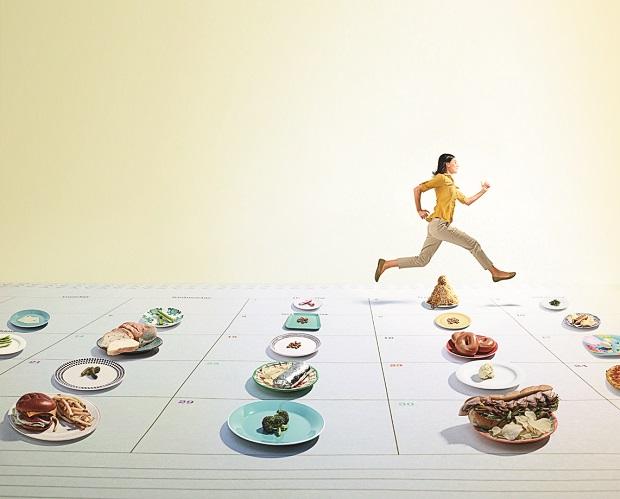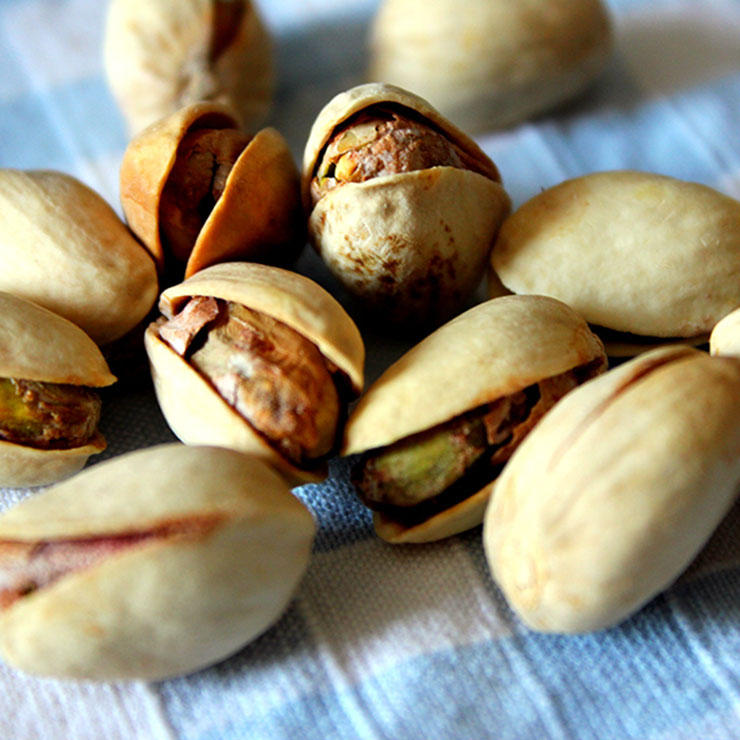You've probably heard about this before. It's spawned a documentary, dozens of books (including a New York Times best seller), and a frenzy among scientists. The National Institutes of Health is funding and conducting several studies to determine how and why it works. With a fan base that consists of everyone from ripped CrossFitters to nerdy scientists, it's enough to make even a diet skeptic like me curious to try it.
The concept of intermittent fasting is simple: Alternate days of eating normally with modified fasting days on which you eat just 500 calories—and watch the pounds drop off. The reality is a bit more daunting. Will I be able to subsist every other day on the same number of calories that a miniature poodle does?
The research on intermittent fasting—along with the stories of people who've tried it and swear by it—helps diminish my doubts. Many of the first studies were led by Krista Varady, a nutritional scientist at the University of Illinois, who is surprisingly animated and engaging for someone who spent her early career in a lab putting rodents on diets. Over the past decade, she has looked at more than 600 people in eight clinical trials of alternate-day fasting, and she's found that obese people reliably lose weight at a very safe rate—about 2 to 3 pounds a week. Equally promising, Varady discovered that measures of cholesterol, triglycerides, inflammation, and blood sugar improve when people fast on alternate days. The results were so impressive that a health publisher called her and convinced her to compile her team's voluminous research into a book, The Every Other Day Diet.
One of the reasons periodic fasting works so well is because it's particularly helpful in burning fat. Your body typically chews through its glucose—or sugar—stores in 10-ish hours; once the glucose in your liver is depleted, your hungry tissue is forced to utilize fat for fuel, Varady says. The upshot: With on-and-off deprivation, you lose over 90% of the weight from fat—a good 15% more than with typical diets—and just 10% from muscle. What's more, since it allows you to hang on to muscle, it doesn't seem to cause the usual diet-related plunge in metabolism.
 Photograph by CJ Burton
Photograph by CJ Burton
Varady tells me she hit on the 500-calorie modified-fast approach after reviewing prior research that looked at complete fasting every other day. "People hated it," she says. "They were miserable." But when she allowed mice, and eventually humans, to eat 25% of their usual intake on fast days (that's 500 calories for women and 600 for men), most adjusted within a week or two and, to her surprise, consumed just 10% more than usual on "feast" days, when they were allowed to eat with complete abandon. "It might be because your stomach shrinks or your appetite hormones change," she says. The persistent 2-day net calorie deficit knocks off pounds—13 in 8 weeks in obese people. Those like me who want to shave off those last 5 or 10 tend to lose about half a pound a week.
It's not the speediest way to slim down. But as I dig into the research, I discover a slew of new studies that point to other enticing benefits—like, for instance, living longer. In a study published last February, University of Florida researchers put 19 people on an alternate-day fasting program for 3 weeks, drawing blood before and after the diet. The postdiet sample revealed that the participants' cells had begun making more copies of a longevity gene—known as SIRT3—that both helps protect against damaging free radical molecules and improves cells' ability to repair themselves.
Its benefits are similar to those of another well-known longevity diet: long-term calorie restriction. "Fasting seems to place stress on cells and prompt them to shift to self-protection mode," says study author Douglas Bennion.
As I read more new research, I learn that fasting might help my mind, too: In animal studies, scientists at the National Institute on Aging discovered that the diet could boost proteins that strengthen neurons and are crucial for learning and memory and may even protect against Alzheimer's disease. Their studies also suggest the diet produces some of the same positive changes in the cardiovascular system as long-term exercise.
But what finally convinces me is Varady's most recent study. In a trial funded by the NIH, she and colleagues found that intermittent fasting is much more effective than everyday dieting at maintaining weight loss—the toughest trick, as any dieter knows. Unlike almost every other diet in the world, the approach is sustainable.
Hunger schmunger, I'm in.
DAY 1
To my husband Gordon's chagrin, it's Friday, and my paltry food choices are making our social plans nonexistent. I've laid in provisions: almonds, celery, arugula, broccoli, cauliflower, pickles, and Sriracha—the flavorful sauce that I'm hoping will gussy up all that rabbit food. Gordon takes one look and texts a friend to meet him for dinner at the local brewpub. Arrayed on the counter, my day's menu does look...how can I put it? Pitiful. Anxious, I call Varady and ask what I am missing. "Protein," she says before I've even finished the question. "About half your calories on the fast day should come from protein, because it's way more filling than vegetables." She also warns me to be sure to drink 8 to 12 glasses of water every day to curb hunger and prevent dehydration—an actual risk when you're taking in so little fluid through food. I guzzle a tall glass, then dash out to Trader Joe's to pick up eggs and lunch meat—and, all right, a wedge of goat Gouda; it's a high-calorie impulse buy, but a reminder that, as Scarlett O'Hara says, "Tomorrow is another day."
This diet may protect against Alzheimer's disease.
With only 500 calories to consume, I chew slowly, which is more pleasurable, I discover, than snarfing. While the expected rumbles from my coddled stomach, which has never known hunger, are uncomfortable, they aren't so excruciating that I cave in and order a pizza. The protein is satisfying, and the Sriracha-dipped veggies do an admirable job of taking the edge off. A study several years ago found that adding hot red pepper to tomato soup caused people to eat 60 fewer calories at the next meal—probably, the researchers speculated, because the spice acts as a mild appetite suppressant. (Here are 25 delicious things you can do with Sriracha.)
That said, deprivation isn't fun. As the day progresses, I spend more and more time daydreaming about creme brulee, sushi, caramels—even, improbably, a cheesy Velveeta-and-broccoli casserole my mom made when I was a kid. By the time I crawl into bed at 9:30, my food fantasies are so frenzied I can hardly sleep. Varady says that usually goes away after a week or so, and in a recent study, she found that the fast days actually help people who suffer from heartburn or GI discomfort sleep better.
 Photograph by CJ Burton
Photograph by CJ Burton
Here's what I ate on Day 1.
(Thankfully, on Day 2, I was able to eat anything I wanted!)
7:30 AM
Coffee, no cream
10:45 AM
Four almonds 28 calories
1:00 PM
Iced coffee (no cream), hard-boiled egg 75 calories
3:00 PM
Bowl of cauliflower florets dipped in Sriracha 50-ish calories
3:30 PM
Sans usual sugar fix, 20-minute nap
3:50 PM
Bowl of broccoli/Sriracha 50-ish calories
Small apple 70 calories
4:15 PM
Hike 4 miles
5:30 PM
Famished. Two slices of ham with mustard 45 calories
Cup of peppermint tea
5:45 PM
Two more slices of ham with slender slices of goat Gouda, which I'd vowed not to eat today 125 calories
7:30 PM
Eight almonds 56 calories
7:45 PM
Four almonds 28 calories
DAY 2
I awaken bleary-eyed but a pound lighter—and ready to attack the contents of my fridge. But as I'm sipping my coffee, I notice something odd: I'm not hungry. Eat! I tell myself, feeling slightly frantic. I have no intention of letting my day of heedless consumption slip away. I nibble some blackberries and have a small bowl of Greek yogurt, but my stomach's not interested.
As I learn from Varady, this is what happens—the reason people on the diet lose weight. On the Facebook page for The Every Other Day Diet, I find plenty of people who confirm this phenomenon.
Joanna Grindle, a 45-year-old nurse and mom of three in Vernal, UT, lost 53 pounds in 4 months and has kept it off for a year by fasting just 1 day a week. "The diet completely changed my relationship with food," she says. "Now I stop eating when I'm satisfied instead of stuffed." Same thing for Jennifer Stewart, 54, a Singapura cat breeder in Crookston, MN, who lost 121 pounds, and Aimee Jones, 35, a hotel employee in Lake Elsinore, CA, who tells me she's been doing alternate-day fasting for just a month but has already lost 12 pounds. "I thought I'd want to binge on sweets, but my sugar cravings are going away," she says. "It's a strange feeling." (Get your sugar cravings under control and lose up to 15 pounds with Sugar Smart Express.)
I eat a salad and a tuna melt for lunch, snack on a piece of dark chocolate in the afternoon, and have skirt steak with grilled veggies and risotto for dinner. I want to overindulge, trust me, but I just can't. I feel disappointed—like it's the last day of a trip to the Bahamas when it's rained the whole time.
DAY 3
Although I expect to be ravenous, I find my second fast day easier. I add new treats—salad with chicken breast, lots of tea ("Warm fluid helps you feel full," promises Varady), bubbly water with lemon (try these calorie-free Sassy water recipes that put a spin on plain water). And I save at least 200 calories for right after my 4 pm hike, which triggers a titanic hunger surge. Although I'm still obsessed with the food I can't eat, falling asleep isn't nearly the struggle it was on Day 1.
DAY 4
I'm more prepared for it, but I still feel an odd disappointment at my disinterest in pastries and bacon that mere hours ago sounded irresistible. I'm seeing how little of my usual eating is driven by actual need. As I make my way through another day of alarmingly sensible meals and snacks, it occurs to me that I'm learning the difference between true hunger and boredom-stress-anxiety hunger—and how frequently I engage in the latter.
 Photograph by CJ Burton
Photograph by CJ Burton
DAYS 5-10
As my fast-day fantasies decreased, I gradually lose a pound and a half—and am filled with an odd sense of accomplishment. I can coexist with hunger! The diet is easier than the usual grind of restriction; the 500-calorie limit forces me to plan my meals and leaves me with so few options I don't even think about foods not on the day's menu.
It's not, however, a social diet. I'm cranky having two slices of chicken while my son and husband chow down on steak. Even worse: going to a dinner party and nibbling on crudites as friends ooh and aah over fondue.
Stewart, who has maintained her weight loss for nearly 2 years, says she rearranged fast days to accommodate her social schedule; when she had three back-to-back "feasts," she'd do an equal number of fast days to make up for it. For maintenance, she does 1,000-calorie fast days, keeps an eye on the scale, and throws in a 500-calorie day when the number goes up.
The diet has its detractors. Sara Gottfried, a doctor and author of The Hormone Reset Diet, worries that it can trigger sugar cravings—and binges. Susan Roberts, a professor of nutrition at Tufts University, adds, "It's risky to tell overweight people to eat what they want every other day, because they could actually gain weight. And, in my practice, very few people are interested in trying it. It could wreak havoc on your life. "
No one is certain why, but fasting seems to prevent and reverse obesity.
Varady herself is quick to admit it's not right for everyone. "But for those who hate the constant vigilance of daily calorie restriction, it seems to work well," she says.
My feelings end up somewhere in the middle. Fasting for a day here or there is doable, but every other day for eternity? Not so much. Despite the fact that I've shed weight, the difficulty of planning and monitoring my eating on fast days makes the diet impractical—and I realize, with a pang, that I'm ready to give it up.
But I'd still like to lose a few pounds, so I turn my attention to the studies I've read on a different approach to intermittent fasting: time-restricted eating (TRE). You eat normal amounts every day but cram it all into a 6- to 12-hour time period—it seems to offer many of the same benefits as alternating fast days but is more suited to my lifestyle.
A rebound diet! Just what I need!
TRE isn't nearly as well studied as alternate-day fasting, but it does have promising results. Obese mice have had luck getting ready for bikini season on the program, according to a recent study at the Salk Institute for Biological Studies in La Jolla, CA. In that 38-week trial, rodents that were restricted to eating within a 9- or 12-hour period stayed svelte, while those who consumed the same number of calories throughout the day became obese; more telling, when the obese, eat-anytime mice were switched to the time-restricted approach, they slimmed down. "It seems to prevent and reverse obesity," says Satchidanda Panda, lead scientist of the study.
 Photograph by CJ Burton
Photograph by CJ Burton
No one is certain why that happens, but Courtney Peterson, who is conducting some of the first human trials with her colleagues at Pennington Biomedical Research Center in Baton Rouge, LA, says not eating for so long affects your body's internal clock—and may dictate the robustness of key functions like metabolic rate.
While some scientific evidence for time-restricted eating focuses on 16-hour fasts, there is flexibility in adapting the approach to fit people's lifestyles. Jonathan Stegall, an integrative medicine physician in Atlanta, has seen results in more than 40 of his patients on a 16-hour-fast diet following a monthlong preparation period emphasizing low-carb, organic, and natural foods. Cindy Santa Ana, 45, a mom of two and integrative nutrition health coach in Bristow, VA, lost 50 pounds in the past 2 years by eating only from 10:30 am to 7 pm. "I don't watch my calories, but I eat healthfully—lots of veggies and lean protein and complex carbs like sweet potatoes and carrots," she says.
I give it a whirl and find that just 1,600 calories leaves me full because it's packed into 8 hours. After a slight hunger pang at 10 pm, I generally fall asleep without being tormented by images of crusty croissants and cheesy omelets. And I'm free to shift my eating window—when we meet friends for dinner at 7, I eat nothing until noon, which isn't that difficult. Though that one heavy, late meal puts half a pound on me, the next day I binge on lemon squares at 2 pm and don't gain an ounce. Either eating earlier in the day is less damaging or I compensated for the cookie binge by eating far fewer calories afterward.
After 8 days of time-restricted eating, I not only have kept off the pound and a half I'd lost but have dropped another two, and my belly is noticeably smaller. I've discovered that I sleep more soundly on a semi-empty stomach and wake up more clearheaded. The diet is the most user-friendly fast around.
Still, I'm not confident I can stick with the strict 8-hour window now that I've reached my goal, so I gravitate to the 12-hour version. Much easier. I use it for 5 weeks and find I both maintain my weight loss and reap fasting's other benefits.
When a friend comments on my newly slender figure, I tell her what I've been up to. "This is the easiest thing I've ever done to lose weight," I say. I mean it.
So from all this, I end up with one rule. Kitchen closes at 7. Turns out I'd rather count minutes than calories.




